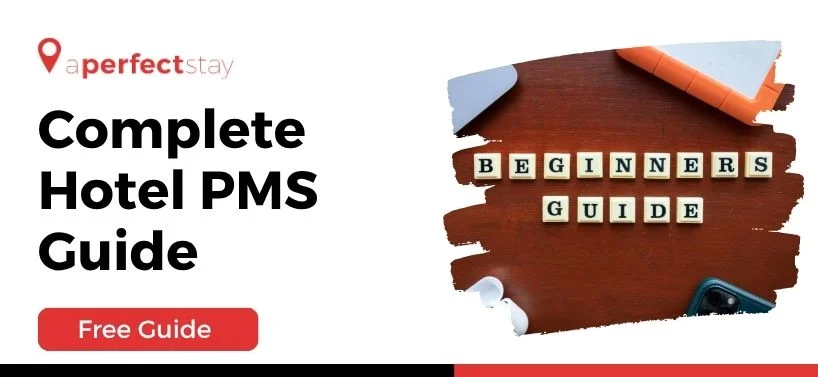The Ultimate Guide to Hotel PMS Systems (Free Download)

Technology is completely changing the game across the mainstream hotel sector as you may already know. In this context, the hotel PMS is becoming indispensable for the smooth management of operations, bookings, housekeeping, and several other functions. Let us learn more about the same below.
Introduction to Hotel PMS- What is a Hotel PMS and Why Does It Matter?
So, if you’re wondering what are hotel PMS systems, they are software tools that streamline and also centralize the entire operations of a hotel. It’s a vital part of any hotel tech stack, helping you handle everything from guest check-ins and check-outs to reservations, sync pricing & availability on OTAs, housekeeping, and reporting.
PMS essentially functions as an all-in-one guest experience platform, front desk automation system, housekeeping management, reservation system, and mobile check-in tool rolled together. So, from inventory management and revenue optimization to reporting & analytics, and OTA integration, it takes care of everything you need to run your hotel better.
Core Features of a Modern PMS- Must-Have Features in a Hotel Property Management System
Now that you’ve got an idea of what this hotel management software is and what it does, let us look at some of the features that it should ideally include.
- Front desk and reservations
- Housekeeping management
- Booking engine
- Analytics and reporting with dashboards
- Cloud based system
- Integration with leading OTAs like: airbnb , vrbo, booking.com using channel manager
- Dynamic pricing and real-time availability using pricelabs
- Mobile check-in
- Up-selling platform for added services like spa, in-room dining, laundry, tour packages, etc.
- Room status tracking
- Maintenance management
These are some of the best hotelier PMS features that you should look for before choosing the best software tailored to your needs.
Benefits of Using a Hotel PMS- Key Benefits of Implementing the Right PMS
Below are the key benefits of hotel PMS tools:
- Improved operations- You can efficiently manage reservations and get real-time booking updates, cut out over-bookings, and optimize room occupancy. Other benefits include automated check-in and check-out procedures with streamlined housekeeping and real-time room status, along with better inventory and rate management (through dynamic pricing).
- Better guest experiences- You may deploy this hotel operations software to personalize guest communication and service, along with automating pre-arrival and post-stay communication as well.
- Higher revenues and better pricing management- The PMS booking system will not only handle reservations, but also adjust rates dynamically depending on demand. This will maximize your revenue potential. Channel managers with pricelab integration, scales your revenue with dynamic pricing.
- Remote management abilities- This cloud-based hotel technology will help you access the system anywhere with internet connectivity. You can reduce upfront costs and simplify the IT management side of operations, while boosting profitability and revenues eventually.
Cloud-Based PMS vs On-Premise Systems: What’s Best for You?
While you’re choosing an all-in-one PMS, you’ll have to decide between an on-premise system and cloud-based PMS as well. Which one works better for you? Let’s undertake a brief comparison below.
Cloud-based PMS-
- Pros- Full system, data, and hardware control which takes care of stringent security needs. It is not dependent on internet connectivity and data is stored on local servers.
- Cons- The upfront costs are higher, while there is an enhanced IT burden in terms of troubleshooting, maintenance, and updates. Scalability is costly and challenging, while there is still potential for data loss and vulnerabilities. Implementation is also slower in this case.
On-Premise PMS-
- Pros- Full system, data, and hardware control which takes care of stringent security needs. It is not dependent on internet connectivity and data is stored on local servers.
- Cons- The upfront costs are higher, while there is an enhanced IT burden in terms of troubleshooting, maintenance, and updates. Scalability is costly and challenging, while there is still potential for data loss and vulnerabilities. Implementation is also slower in this case.
How to Choose the Best Hotel PMS for Your Property
So, how do you choose the best hotel PMS for your property? You can use this guide for better insights. Find a checklist that you can download as a PDF to help you make the right choice without any hassles. Some of the key considerations in this case include your business requirements, the level of support given by the provider, the need for integrations, the size of the property, and so on.
PMS vs Channel Manager – Do You Need Both
There is another last thing worth considering in this regard, i.e. the PMS vs channel manager debate. Do you really need both? They are both vital for successfully running your hospitality operations, although the purposes are different. The PMS focuses on all aspects of your operations, including bookings, revenues, housekeeping, guest management, billing, reporting, and more. At the same time, the channel manager primarily takes care of external inventory distribution, syncing the availability, rates, and so on across several online platforms.
However, in some cases, if you’re going for an all-in-one PMS, you’ll not require a separate channel manager. A good PMS should include the in-built channel manager, enabling dynamic pricing, rate adjustments, real-time inventory updates, cutting out overbookings, and enhancing guest experiences. So, on that note, here’s to choosing and implementing the right PMS for your hotel/hospitality business. It will put you on the right track towards future success for sure. Download the guide today and get started!



















